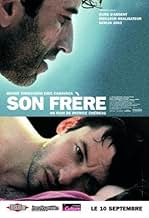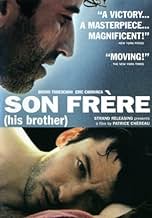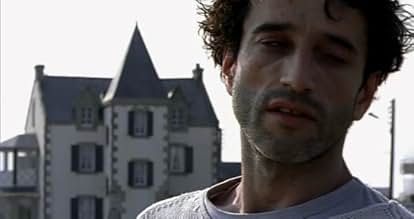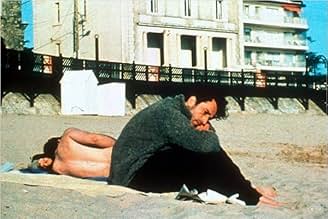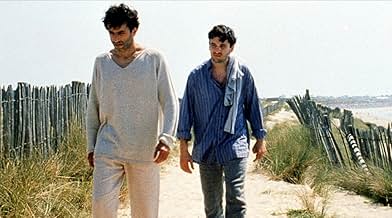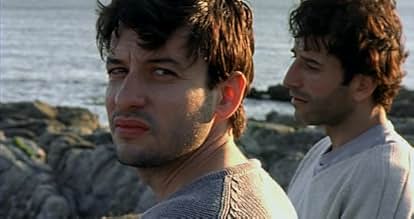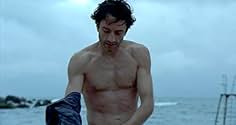Ajouter une intrigue dans votre langueTwo brothers with a problematic relationship in the past, find together again when the elder one gets a dangerous disease and asks his brother to accompany him to several doctors.Two brothers with a problematic relationship in the past, find together again when the elder one gets a dangerous disease and asks his brother to accompany him to several doctors.Two brothers with a problematic relationship in the past, find together again when the elder one gets a dangerous disease and asks his brother to accompany him to several doctors.
- Réalisation
- Scénario
- Casting principal
- Récompenses
- 2 victoires et 4 nominations au total
Avis à la une
8B24
When I saw this film recently on the Sundance Channel, I had no advance knowledge of it. That is how I prefer to watch any film, but publicity -- being what it is -- usually stands in the way of any such cleanly objective approach.
In this case, the story is told in segments that play around with chronological time yet achieve an overall effect of linearity. Central to the film are scenes in the hospital that capture as no other film I have seen the stark and compressed place where life and death coexist. Normally that suggests soap opera bathos, as in such TV dramas as ER or General Hospital. But here is only an overwhelming display of truly remarkable clinical minutiae, against which an inner drama between the characters is allowed to play out either in silence or in visual takes showing the characters reacting to an unfolding revelation of who they really are and how they relate to each other. The director achieves his goal through understatement, with few exceptions. Quintessentially French.
Even the love scenes, such as they are, have a clinical feel to them. If I have one negative comment, it is that the film lacks any contrasting relief from its lugubrious tone, no touch of irony or brief bit of self-effacement. Small wonder some viewers may find it flat or uninspiring.
Yet the tacit theme of finding new ways of looking at oneself through suffering and change stands out. The two brothers are seen to rekindle a relationship that had been lost or misplaced, even as death approaches inexorably. I would not mind sitting through it again to examine more closely some of its subtleties hiding behind the sledgehammer reality of hospital life.
In this case, the story is told in segments that play around with chronological time yet achieve an overall effect of linearity. Central to the film are scenes in the hospital that capture as no other film I have seen the stark and compressed place where life and death coexist. Normally that suggests soap opera bathos, as in such TV dramas as ER or General Hospital. But here is only an overwhelming display of truly remarkable clinical minutiae, against which an inner drama between the characters is allowed to play out either in silence or in visual takes showing the characters reacting to an unfolding revelation of who they really are and how they relate to each other. The director achieves his goal through understatement, with few exceptions. Quintessentially French.
Even the love scenes, such as they are, have a clinical feel to them. If I have one negative comment, it is that the film lacks any contrasting relief from its lugubrious tone, no touch of irony or brief bit of self-effacement. Small wonder some viewers may find it flat or uninspiring.
Yet the tacit theme of finding new ways of looking at oneself through suffering and change stands out. The two brothers are seen to rekindle a relationship that had been lost or misplaced, even as death approaches inexorably. I would not mind sitting through it again to examine more closely some of its subtleties hiding behind the sledgehammer reality of hospital life.
Breaking with the visual pyrotechnics and operatic flourishes he's been associated with in the past, this devestatingly intimate drama solidifies Patrice Chereau's reputation as one of the greatest filmmakers of our time. The simple story (adapted by Chereau and Anne-Louise Trividic from Philippe Besson's novel) deals with two somewhat estranged brothers -- one gay, one straight -- who become reconciled when one of them (the straight one) contracts a rare blood disease and begins the process of dying. As the slightly smug, high-living brother brought low by death Bruno Todeschini is excellent as always. But the revelation is Eric Caravaca as the surviving brother. His fresh, unfussy performance grows in power as the situation goes from bad to worse. Catherine Ferran as the perfectly professional, but utterly unhelpful, doctor in charge is quietly frightening. Chereau regulars Sylvain Jacques and Pascale Greggory drop in for a telling turn or two, and Maurice Garrel (father of filmmaker Philippe Garrel) has a few nice scenes as an old man they meet at their beach house. But over all it's primarily a two-hander of intense intimacy. There's no music until the climax when the voice of Marianne Faithfull let's loose on the soundtrack with a song she co-wrote with Angelo Bandalamenti. And when the end credits finally roll you'll probably find yourself staggering out the door like I did. If you've ever lost someone close to you you'll feel this movie right inside your skin.
10EdgarST
This was Chéreau's best since "L'homme blessé", an excellent little film about affection, compassion, brotherly love, death, courage. The proposed situation (an older brother dying from a blood disease seeks the support of his younger brother, somehow evoking the most critical days of the spread of AIDS) is handled with a calm tone, in a rather "Cartesian approach", not lacking bursts of emotion, but avoiding facile sentimentality. Fine script by Chéreau and Anne-Louise Trividic, from a novel by Philippe Besson, with a clever structure intersecting different planes of time, plus good performances all over, especially by Bruno Todeschini and Éric Caravaca, and firm direction by Patrice Chéreau.
Director Patrice Chereau, famous for many great films, made this movie. This, of course, let me hope that I would see a good film, at least. But no, this one is not. It is a slow film, and boring.
Two brothers with a problematic relationship in the past, find together again when the elder one gets a dangerous disease and asks his brother to accompany him to several doctors.
So far, so good: This could have been a typical French film about relationships. This could have been a sad tragedy, watching the one brother getting ill. This could have been a good movie, after all, because the acting is really good. But, I can only repeat: This is a boring, slow, far too long picture. The script is poor, and the directing uninspired. Very disappointing.
Two brothers with a problematic relationship in the past, find together again when the elder one gets a dangerous disease and asks his brother to accompany him to several doctors.
So far, so good: This could have been a typical French film about relationships. This could have been a sad tragedy, watching the one brother getting ill. This could have been a good movie, after all, because the acting is really good. But, I can only repeat: This is a boring, slow, far too long picture. The script is poor, and the directing uninspired. Very disappointing.
I saw Son Frere recently in Montreal in the original French (no subtitles). It certainly was a "brooding" dark film that really concentrated on closeups and detail in the European tradition. For me, the changes in time and settings did not take away from the relationship theme of the two brothers and their gradual reconciliation. I thought the detailed hospital scenes were a bit long but very realistic, though sombre. Ironically, I did not find the film depressing as it gave hope that something good comes in times of crisis. I will remember the film more for the two main actors, who I think were very well cast in these roles. It was more like watching a play or "the real thing" with long moments of silence or little spoken to reflect. Not a film that may have "mass appeal" but worthwhile seeing and memorable.
Le saviez-vous
- Bandes originalesSleep
Performed by Marianne Faithfull
Written by Marianne Faithfull, Frank McGuinness (as Frank McGuiness), Angelo Badalamenti
© ANLON MUSIC Co. (P) 1995 ISLAND RECORDS INC.
Avec l'aimable autorisation de Universal Music Projets Spéciaux
Meilleurs choix
Connectez-vous pour évaluer et suivre la liste de favoris afin de recevoir des recommandations personnalisées
- How long is His Brother?Alimenté par Alexa
Détails
Box-office
- Montant brut aux États-Unis et au Canada
- 22 834 $US
- Week-end de sortie aux États-Unis et au Canada
- 6 802 $US
- 4 avr. 2004
- Montant brut mondial
- 131 195 $US
- Durée1 heure 32 minutes
- Couleur
- Mixage
- Rapport de forme
- 1.85 : 1
Contribuer à cette page
Suggérer une modification ou ajouter du contenu manquant

Lacune principale
By what name was Son frère (2003) officially released in Canada in English?
Répondre

